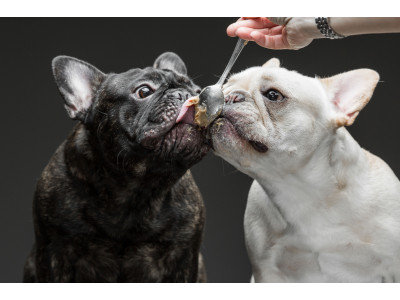French Bulldog Allergies: Common Causes and Management
The French Bulldog is a dog with a recognizable appearance that can't be confused with the appearance of other varieties of bulldogs. “Frenchies” belong to the decorative breeds and are perfect for keeping in an apartment, while they are quite powerful and stocky, with strong bones, developed muscles and a fighting character.
Our Top Puppies
Despite their quite good health, dogs of this breed are prone to allergies, and most often this is how they react to inappropriate nutrition. Owners should be aware of the disease's symptoms in order to provide first aid to their pet if necessary.
Types and causes of allergies
Allergies in Frenchies can be triggered by many factors - from eating allergenic foods to using inappropriate dog grooming products.
Food
Due to the rejection of certain types of protein by the immune system of French Bulldogs, inclusion of their sources in the diet is fraught with the development of allergies.
When creating a menu or choosing food for your pet, you should avoid the presence of:
- chicken meat
- seafood
- eggs
- dairy and fermented milk products
- yeast and soy
- corn
- red vegetables and fruits
- vegetable oils
- fish oil
Food allergies have a cumulative effect, which complicates the process of identifying the allergen.
Medicinal
Among medications, antibiotics are especially dangerous; you should also be wary of:
- barbiturates
- quinine
- aminophenazone
- morphine
- chloral hydrate
- brewer's yeast
- alfalfa extract
- novocaine
- vitamin B1
Products containing live bacteria, along with flower and bee pollen, can also pose a risk.
Chemical
Using unsuitable shampoos and soaps for bathing your French Bulldog can trigger the onset of contact dermatitis. It's essential to utilize only hypoallergenic hygiene products.
Household chemicals can also cause a negative reaction, so access to them should be prohibited.
Autoallergy
This type of allergy is caused by autoimmune diseases, which cause the dog's body to produce its own allergens. You can get rid of them only after accurately identifying the disease that caused disruptions in the immune system.
Contact with humans
French Bulldogs may develop contact dermatitis in response to human hair, epithelial particles, and dandruff. To lower the risk of an allergic reaction in such cases, it is advisable to minimize close contact with your pet.
Other irritants
Although infrequent, there have been instances of allergic reactions to dander and animal hair, including one's own, as well as reactions to parasite and insect bites, viruses, and helminths.

Most common symptoms
Allergies primarily affect the skin of French Bulldogs, resulting in manifestations such as:
- redness and inflammation
- constant itching
- forcing the pet to scratch the skin until it bleeds
- the appearance of a rash in the form of ulcers and blisters
- sweating underarms
- local baldness
- unpleasant odor
- dry epidermis
- dandruff
It's crucial to observe the specific location of itching in your pet. Scratching in the perineal or tail base area can indicate parasite infestation or an allergy to flea bites, while itching in the nose, ears, and abdomen is indicative of atopic dermatitis. Additionally, allergies may lead to nasal and ocular discharge as well as the development of conjunctivitis in the dog.
The most striking and accurate symptom of allergies in a French Bulldog is persistent ear infections.
In addition to the manifestation of certain symptoms, the behavior of the French bulldog also changes - the dog becomes nervous, shows anxiety, scratches, licks or gnaws at areas where irritation is localized, and shakes its head. With allergic inflammation on the paws, the Frenchie experiences pain and begins to limp.
There are cases when allergic enteritis causes symptoms of food poisoning:
- nausea and vomiting, in which foam and bile are released from the mouth
- bloating, colic, frequent release of gasses
- diarrhea, the appearance of mucus in the stool
The extreme symptom of an allergy is anaphylactic shock. If you suspect an allergic reaction, you should take your dog to the veterinarian as soon as possible. Lack of necessary treatment can be fatal.
You can reduce the itching and pain of your pet if allergic inflammation occurs between the toes by diluting white vinegar with water and wiping the affected areas with this solution. Rubbing with cool water will help you cope with itching on your Frenchie’s body; the effect lasts for about half an hour.
Important to note that this method can only be used in hot weather, otherwise your French Bulldog will get a cold.
If your dog begins vomiting foam, it's advisable to skip the next scheduled meals and offer your pet frequent drinks instead of food throughout the day. If the vomiting persists, it's imperative not to delay a visit to the veterinarian. Testing for toxins and administering antiemetic medications may be necessary.
If your pet is experiencing allergies characterized by dandruff and heightened dry skin, it's recommended to discontinue the use of any cosmetics currently employed for their care.
Drug treatment
Keep in mind that you should always ask your veterinarian for the best way to help your Frenchie and treat their skin. It is essential to consult with a vet for a proper diagnosis and treatment plan tailored to your French Bullldog's specific condition. Here is a list of some common drug treatments which may be considered:
- Antihistamines: These can help reduce itching and inflammation caused by allergies. Common antihistamines used for dogs include diphenhydramine (Benadryl), cetirizine (Zyrtec), and loratadine (Claritin). The dosage should be determined by your vet.
- Steroids (Corticosteroids): Prednisone or prednisolone may be prescribed to reduce severe inflammation and itching. They are often used for short-term relief due to potential long-term side effects.
- Topical Steroids: For localized itching or rashes, your vet may recommend a topical steroid cream or ointment.
- Cyclosporine (Atopica): This immunosuppressive medication can be used for long-term management of allergic skin conditions.
- Apoquel (Oclacitinib): This medication is specifically designed to target itch and inflammation associated with allergies. It can provide relief without the side effects of steroids.
- Allergy Testing and Immunotherapy: In some cases, allergy testing (intradermal or blood) can identify specific allergens. Based on the results, the vet may recommend immunotherapy, which involves regular injections to desensitize your Frenchie to the allergens.
- Fatty Acid Supplements: Omega-3 fatty acid supplements (like fish oil) can help improve the condition of the skin and reduce itching.
- Antibiotics or Antifungals: If a secondary bacterial or fungal infection is present due to excessive scratching, your vet may prescribe antibiotics or antifungal medications.
- Shampoos and Topical Treatments: Medicated shampoos or sprays with ingredients like chlorhexidine or ketoconazole can help manage skin infections and itching.
Always consult with a veterinarian before starting any medication or treatment for your French Bulldog's skin allergies. They can provide a proper diagnosis and recommend the most appropriate course of action based on your French Bulldog's specific needs.
Hypoallergenic food
It's essential to steer clear of cheap dog food that includes harmful chemicals, artificial flavors, and dyes, as they can adversely affect the health of French Bulldogs. Instead, consider using brands like Purina HA Diet and DVM Exclude, as their proteins are broken down and pose no harm to dogs. Another option is Hill's Prescription Diet – Canine Z/D, which is known to be non-allergenic.
For French Bulldogs with heightened sensitivity, well-balanced foods from reputable companies such as Nature's Recipe Innovative and Veterinary Diets can be beneficial.
When selecting food that is appropriate for your pet, it's important not to make a sudden switch from one type to another. This transition should be carried out gradually, incorporating fasting or fasting days into the process.
Does your Frenchie need to diet?
Food allergies and intolerance to certain foods occur more often in Frenchies than in other breeds. If you suspect a food allergy, you should put your pet on an elimination diet, which is based on excluding foods from the dog’s diet that can trigger the development of an allergic reaction.
During the first 3-4 days, give the dog only bland rice or buckwheat, then add boiled turkey to the porridge. You need to stick to this diet for 2 weeks. This diet provokes disruptions in the gastrointestinal tract, so at the beginning of the 3rd week you need to add low-fat kefir to your pet’s diet. If after 3 weeks there are no signs of allergy, you should introduce one of the products suspected of having allergens into the dog’s menu, then after 1-2 weeks - another one, and continue this until the product causing the allergy is detected.
Keep in mind that the allergy could be caused by greens or flowers that the dog ate while walking. It is important to monitor your pet during walks and not allow him to eat anything.
Preventive measures
To prevent allergies, it is necessary to protect the French bulldog from any contact with products and substances that provoke its development and to carry out timely treatment against fleas, ticks and helminths. It is necessary to monitor your French Bulldog's diet, especially before they turn 6 months old - it is puppies that most often react negatively to food.
It is important to immediately train your French Bulldog puppy not to ask for food from the table and to ensure that family members or guests do not give them prohibited foods as treats.
Sometimes allergic reactions in French bulldogs occur even with a balanced diet, which is associated with the accumulation of toxins in the animal's liver. Once every few months, it is recommended to carry out a preventive course of nutrition consisting of rice or buckwheat and meat.

